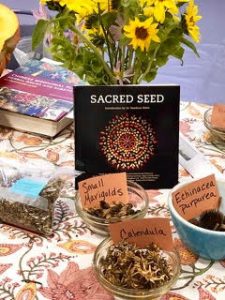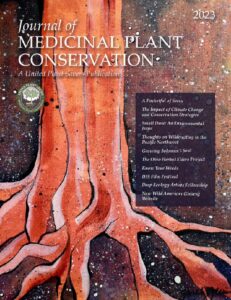Weaverville, North Carolina
Stewards: Hart and Mary Morgaine Squire
 Back in 1962, in Connecticut, Hart Squire led his first plant walk in the woods. He had been observing and tending the native plants behind his house—the trilliums (Trillium spp.), skunk cabbage (Symplocarpus foetidus), lady’s slipper (Cypripedium acaule), and partridge berry (Mitchella repens). He wanted to share the unique beauty and medicine of these plants with others, so he gathered a group together and pointed all these plants out to them along the trail. At the age of 12, Hart knew that these green beings were special and needed to be honored and protected.
Back in 1962, in Connecticut, Hart Squire led his first plant walk in the woods. He had been observing and tending the native plants behind his house—the trilliums (Trillium spp.), skunk cabbage (Symplocarpus foetidus), lady’s slipper (Cypripedium acaule), and partridge berry (Mitchella repens). He wanted to share the unique beauty and medicine of these plants with others, so he gathered a group together and pointed all these plants out to them along the trail. At the age of 12, Hart knew that these green beings were special and needed to be honored and protected.
In 1968, Hart’s family bought a piece of property in the Reems Creek Valley, in a small town called Weaverville, about 20 miles north of Asheville, North Carolina. His parents still lived in Connecticut at the time, but Hart moved on to the land and continued to deepen his relationship with the plants. He used all of his resources to improve the earth upon which he had landed—a piece of property that had been a local dump and had suffered so much erosion from poor land management that one gulley He used all of his resources to improve the earth upon which he had landed—a piece of property that had been a local dump and had suffered so much erosion from poor land management that one gulley stood 20 feet deep and 30 feet wide!
Hart spent years clearing away trash and hauling it to the dump, while he spent every opportunity he could, hauling in any kind of manure, hay, wood chips, or leaves to make compost pile after compost pile to build up the soil. He was a young idealist and was determined to take a piece of land completely depleted (the gardens were really like subsoil—bright red and either sticky and slimy when wet, or hard as a brick when dry).

For many years, Herb Mountain Farm sold flowers, herbs, garlic, and vegetables to local stores and restaurants. All
this time Hart was mostly ridiculed by the local Extension Service and his neighbors for not ever using chemicals for growing his gardens and small farm. Back then, the USDA didn’t think Hart was a legitimate “farmer” and laughed at the idea that a farm could not use chemicals! Forty years later, few people realize what a “hard-row- to-hoe” Hart was determined to maintain, as organic agriculture has become more and more mainstream. Herb Mountain Farm is now celebrating its fiftieth year chemical-free!
Over the years this land has become a jewel of a place, mostly because Hart has dedicated his life to it. Hart sometimes shows people around and points out how Nature—way more than him—has regenerated and healed the land simply because of humans not getting in Her way. In 2005, Mary Morgaine came on board as an employee on the garlic crew and began applying her knowledge of herbs and gardening while learning from Hart countless ways to steward Earth with consciousness and loving tenderness. In 2012, they were married and began to grow a vision of turning the property into a learning center. Many energy efficient buildings were built or renovated here, and so they worked on transforming two of them into lodging for guests. They also established a mile long nature trail around the land and named it in honor of Mary Morgaine’s late partner and botanical explorer, Frank Cook and added numerous edible and
medicinal gardens in addition to what was already here. Inspired by United Plant Savers Botanical Sanctuary Network, they became members in 2016 and continue tending to and bringing many plants into the different ecosystems of the property.
Every plant is like an old or new friend. The winter gets hard because we can’t see our friends as much, but we know they are there, just taking a long and hearty rest, like we all should! Our dear human friend, Marc Williams, Executive Director of Plants and Healers International, has also helped increase the diversity of plant life here by donating many native plants over the past few years. These include several Trillium spp., Jeffersonia diphylla, Asclepias spp., Ligusticum canadense, Chamelirium luteum, and lots more! And thank you Robert Eidus of
the NC Ginseng and Goldenseal Company for donating goldenseal (Hydrastis canadensis) starts, as we try to encourage and coax that remarkable being back into the landscape.
Hart starts a lot of the plants by seed, including spikenard (Nardostachys jatamansi), angelica (Angelica spp.), butterfly weed (Asclepias tuberosa), echinacea (Echinacea spp)., blazing star (Liatris spicata), lobelia (Lobelia spp.), wild senna (Senna hebecarpa), bee balm (Monarda spp.), and anemone (Anemone spp.). These are just a few of the thousands of seedlings Hart sets out every year.
Mary Morgaine sprinkles the trail with shooting stars (Dodecatheon spp.), yellowroot (Xanthoriza simplicissima), turtleheads (Chelone spp.), phlox (Phlox spp.), and horsetail (Equisetum spp.). We have over 150 species of trees and shrubs on the farm and over 550 species of perennial plants, not including ferns and mosses! This is our life work, our passion, to cultivate diversity and work in respectful planetary stewardship with this land. Our website (herbmountainfarm.com) has a complete list of our species inventory if you would like to read further.
Many years ago we also turned 105 acres of this property into a 100% protected conservation easement that is also available for hikes and plant-walking. The upper part of our mountain land holds even more botanical treasures, as a hike involves moving up through close to a thousand feet of altitude—like going from southern Pennsylvania to central Connecticut climate zones! Our buildings, nature trail, and gardens are at about 2800 feet.
We have just this year (2019) finished our remodel and opened our Learning and Lodging Center with the vision it will draw folks here looking for not only a place to rest and renew, but to also teach and learn—to find something of deep meaning from nature to take back out into the world and share with others. We are determined to leave a legacy of Herb Mountain Farm as a learning environment—drawing in teachers to hold classes and workshops centered on medicinal and edible plants and healing, as well as providing an advancement of study centered around restoring and honoring Nature.
We hope to meet some of you plant lovers along the journey!









